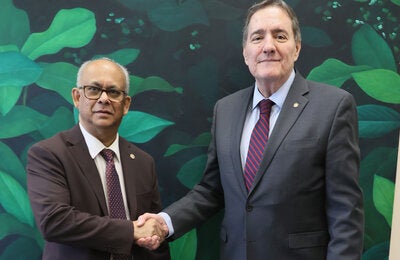
Washington, D.C, January 11, 2012 (PAHO/WHO) — The presidents of Haiti and the Dominican Republic joined the Pan American Health Organization/World Health Organization (PAHO/WHO), UNICEF, and the U.S. Centers for Disease Control and Prevention (CDC) today in calling for major international investments in water and sanitation infrastructure to eliminate cholera from the island of Hispaniola.
Representatives of PAHO/WHO, UNICEF, and the CDC appealed to donor countries and agencies to fund the investments by honoring pledges made after Haiti's 2010 earthquake and through new funds specifically targeted at water and sanitation infrastructure.
Such investments are needed to bring Haiti up to the level of neighboring countries in terms of access to clean water and sanitation services, proponents said. Even before the earthquake, only 63 percent Haitian residents had access to improved drinking water, and access to sanitation services actually declined from 26 percent of the population in 1990 to 17 percent in 2008. These conditions facilitated the rapid spread of cholera following the original outbreak in October 2010.
"Decades of neglect and the failure to invest in these areas have led to many illnesses associated with the consumption of contaminated water, lack of education in the practice of good hygiene, and poor excreta management, to mention but a few factors," said President Michel Martelly of Haiti in a recorded video message. "More than ever before, now is the time to address these deficiencies."
"Two years after the catastrophic earthquake that devastated Haiti on 12 January 2010, the time is ripe for reiterating our willingness to aid the Haitian people insofar as our material resources permit," said President Leonel Fernández of the Dominican Republic in a recorded message. "We believe that we can bring greater forces to bear in 2012 to combat cholera and thus relieve the suffering of our peoples."
The outbreak, which began 10 months after the earthquake, has become one of the largest cholera epidemics in modern history. By the end of 2011, it had made more than half a million people ill and claimed over 7,000 lives in Haiti, with over 21,000 ill and 363 deaths in the Dominican Republic.
Although both countries were cholera-free before the current outbreak, a cholera epidemic in the 1990s killed some 12,000 people in 21 countries in Latin America and the Caribbean. It was brought under control after eight years of international public health efforts that included massive investments in water and sanitation infrastructure.
Since the start of the current outbreak, Haiti and the Dominican Republic, along with PAHO/WHO, UNICEF, the CDC and other partners, have been working to reduce deaths and illnesses from cholera through improvements in patient treatment, surveillance, access to safe drinking water, solid waste management, and community education and mobilization. While these efforts will continue, proponents of the call to action said it was now time to aim at a more ambitious goal.
"We have the duty to have our eyes on the elimination of cholera," said PAHO Director Mirta Roses. "We should not accept endemic cholera in Hispaniola, and we can use the lessons we learned in eliminating cholera from Latin America and the Caribbean in the 1990s."
"The long-term solution for eliminating cholera in Haiti and the Dominican Republic is investment in infrastructure for water and sanitation and proper maintenance of that infrastructure," said Dr. Kevin De Cock, director of the Center for Global Health at the CDC.
As follow-up to today's call to action, Dr. Roses said the three agencies involved would form a new task force led by the governments of Haiti and the Dominican Republic and supported by national and international water and sanitation experts. The group will be charged with developing a timeline and a detailed plan for making infrastructure investments and carrying out supporting public health campaigns.
"Investments in infrastructure are absolutely essential," said Sanjay Wijesekera, head of UNICEF's water and sanitation program. "These will take time to attain adequate coverage, and they can be complemented with softer interventions," such as initiatives focused on community mobilization and behavior change.
Estimates of the costs of needed water and sanitation infrastructure range from $746 million to $1.1 billion (Inter-American Development Bank, Office of the Haitian Primer Minister, World Bank). Following the 2010 earthquake, donor countries and agencies pledged some $4.5 billion to support reconstruction and recovery in Haiti, according to the United Nations Office of the Special Envoy for Haiti. About $2.4 billion, or 53 percent, of those pledges have been honored.
Cholera vaccination is also under consideration as part of the elimination efforts, said Dr. Jon K. Andrus, PAHO's deputy director. He said Haiti's Ministry of Health, in conjunction with the U.S.-based nongovernmental organization Partners in Health, is carrying out pilot projects to assess the viability and effectiveness of cholera vaccination on a massive scale in Haiti.
"The people of Haiti have suffered from decades of neglect," said Dr. Roses. "It is time to call a halt to this scourge and join together to begin the practical steps needed to eliminate cholera."



